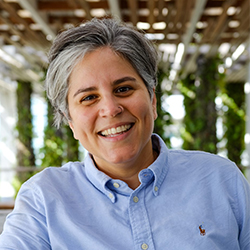- About
- Episodes
- Trailer
- E1: Argentina – Birthplace of the Green Wave
- E2: El Savador – No Exceptions
- E3: Latinidad – Sex and Sexuality
- E4: From Three Exceptions to Decriminalization
- E5: The Fight for Three Exceptions – Is It Enough?
- E6: Brazil – Crossing Borders For Care
- E7: U.S. Part 1 – Storytelling, Conversation, & Community
- E8: U.S. Part 2 – The Green Tide Rises
- BONUS EPISODE: Election Recap – This Is Not The End Of The Fight
- Voices
- Join The Movement
- Impact
- Support
- Contact
Born and raised in Panama City, Panama, Charo Valero (she/her) has called Miami her home for the past 17 years, where she currently resides with her wife. Charo is primarily an activist and organizer, prioritizing statewide policies that impact reproductive justice and building power and solidarity in communities of color. She is currently the State Manager for the Latina Institute for Reproductive Justice Florida and serves on several boards including Miami-Dade County Commission for the Status of Women, Southern Birth Justice Network, and The Alliance for LGBTQ Youth.
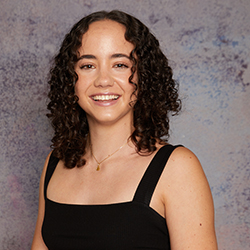
Maria Isabel Di Franco Quinonez (she/her) is a Research Director and runs Equis’ flagship electoral research project: the Equis State Series. She utilizes quantitative and qualitative research to produce critical insights about Latino voters, spanning 10 battleground states. She also serves as a liaison between the Research Department and some of Equis’ key partners. Before joining Equis in 2021, she served as a field director for a local race in New York City, and was a field organizer for the Democratic Party of Georgia as well as the Arizona Democratic Party, taking part in their Latino organizing program. Maria is passionate about translating research into action – in order to best serve our Latino community. She’s originally from Venezuela and is a graduate of the University of California, Berkeley.
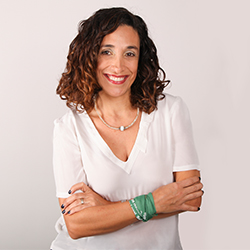
Ximena Casas (she/her) co-leads the Regional Initiative on the Criminalization of Abortion in Latin America with Ríos-Rivers. Prior to this, she was the Women’s Rights Researcher for the Americas at Human Rights Watch. She also worked for Planned Parenthood Global as the Associate Director for Regional Advocacy Strategy where she managed the Latin American Regional Advocacy and Policy projects and was the region’s specialist on international jurisprudence on reproductive rights. She previously worked at the Center for Reproductive Rights (CRR), where she focused on litigation strategies to advance the recognition of sexual and reproductive rights of Latin American women and was the Americas associate at Human Rights Watch. She has specific knowledge of international human rights law, humanitarian law, and gender law. She is an expert in non-discrimination and gender equality, with strong experience in intersectionality and sexual and reproductive rights and health. Ximena grew up in Colombia and has experienced extensive travel and fieldwork through the Latin American and Caribbean region.

Lourdes A. Rivera (she/her/ella) joined Pregnancy Justice as its first president in 2023, bringing more than 30 years of experience as a respected leader in reproductive rights and justice, health law and policy, and philanthropy. She recently served as a senior vice president of U.S. Programs at the Center for Reproductive Rights, overseeing comprehensive litigation, policy advocacy, and partnership strategies. Lourdes is a co-founder of California Latinas for Reproductive Justice and the Groundswell Fund, a board member of the National Health Law Program, and board president of the Brush Foundation. She also received an American Bar Association presidential appointment to the ABA’s Coalition on Racial and Ethnic Justice. She earned a J.D. from Yale Law School and a B.A. from Yale University. An enthusiastic salsa dancer since childhood, Lourdes can lead and follow with grace.

Maria Consuelo Mejia is an anthropologist with a Master’s and a Ph.D. in Latin-American Studies from the National Autonomous University of Mexico (UNAM). She was director of Catholics for the Right to Decide for 25 years and played an important role in the construction of networks of the feminist movement such as the National Alliance for the Right to Decide (ANDAR), the Latin-American Network of Catholics for the Right to Decide, and the Latin American Consortium Against Unsafe Abortion (CLACAI). Among many other things, she is the author and co-author of numerous articles and books. Her track record and commitment to the human rights of women have earned her several awards, including the “Omecíhuatl” medal granted by the Institute for Women of Mexico City; the Medal of Honor for her contributions to Sexual and Reproductive Health granted by the International Planned Parenthood Federation, Western Hemisphere Region (IPPF/WHR); the Hermila Galindo Award; and the Elvia Carillo Puerto recognition. Additionally, she was nominated by the international organization Women Deliver as one of the 100 more inspiring women in the world committed to the life of women and girls.
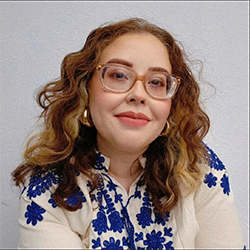
Nancy Cárdenas Peña (She/Her/Ella) is the Campaign Director for Abortion on Our Own Terms. She is a policy expert and an organizer at heart advocating at the intersection of im/migration and reproductive justice with a desire to see communities exercise their full bodily autonomy. Born and raised in the Rio Grande Valley, she lived in Mexico before returning to the United States and continuing her public education. Nancy graduated from the University of Texas at Austin with a degree in political science. She worked for the City of Austin developing and promoting the passage of local level reproductive healthcare initiatives and served on the Commission for Women. She is also a part of the Texas We Testify cohort, a group of abortion storytellers seeking to advance narratives around abortion access. Nancy was also a board member of the Frontera Fund, an abortion fund that exclusively serves the Rio Grande Valley with practical support and abortion needs. Nancy is fluent in both English and Spanish.

Verónica Cruz Sánchez, a feminist and founder of the Las Libres Center for Sexual Health Information in the Central Region, is a social worker by profession. She has specialized in facilitating access to safe, legal, and free abortion services. She has developed support processes for women and girls who are victims of rape, helping them access legal abortion and justice. She has also created training programs, support networks, and models for accessing safe medical abortions through women’s networks to promote the social decriminalization of abortion. Additionally, she has established organizational and training processes for researching, documenting, defending, and litigating cases of women criminalized for abortion and related offenses. Her key areas of work and expertise include: Social decriminalization of abortion Legal decriminalization of abortion for total decriminalization Elimination of the stigma associated with abortion Social support for women who choose to terminate an unwanted pregnancy, helping them experience abortion as a human right. In 2006, she received the award for best human rights defender in the world from Human Rights Watch. In 2023, she was named one of the 12 most influential women in the world by TIME magazine.

Maria Isabel Di Franco Quinonez (she/her) is a Research Director and runs Equis’ flagship electoral research project: the Equis State Series. She utilizes quantitative and qualitative research to produce critical insights about Latino voters, spanning 10 battleground states. She also serves as a liaison between the Research Department and some of Equis’ key partners. Before joining Equis in 2021, she served as a field director for a local race in New York City, and was a field organizer for the Democratic Party of Georgia as well as the Arizona Democratic Party, taking part in their Latino organizing program. Maria is passionate about translating research into action – in order to best serve our Latino community. She’s originally from Venezuela and is a graduate of the University of California, Berkeley.

Nery Espinosa (she/her) serves as Equis’ Senior Vice President of Partnerships and Communications. In this role, she oversees the organization’s programmatic implementation work, broader partners and key opinion formers outreach, and press and communications strategy. Nery has over a decade of experience working at the intersection of advocacy, politics, and media. Most recently she was a founding member and VP at NEWCO Strategies, where she led work with national, state, and local organizations, campaigns and movements on a variety of programs and issues with partners across the progressive ecosystem. Prior to that, Nery held roles at The Raben Group, FitzGibbon Media, and Center for American Progress, where her work included strategic communications, media relations, program and policy development, project management and long-term strategic planning. Born in Mexico and raised in Texas, Nery has spent her career advocating for communities of color, the Latino community, and the immigrant community through issue advocacy campaigns, civic engagement work and long-term power building. Nery graduated from Carnegie Mellon University with a B.S. in Political Science and Latin America Studies.
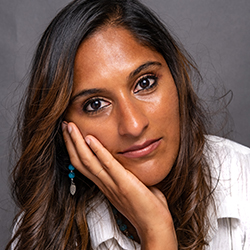
Roopan Gill is an obstetrician gynecologist with expertise in family planning and abortion care. She completed her training in Canada and holds a Masters in Public Health in Global Health from Harvard T.H. Chan School of Public Health. She has worked as an emergency obstetrician gynecologist in Nigeria and Yemen with MSF and as their Women’s Health Advisor supporting projects in countries such as Malawi, Chad and Pakistan. She has previously worked with the World Health Organization (WHO) providing technical expertise to its Department of Sexual and Reproductive Health Research. She played a pivotal role in the WHO Essential Medicines List application to bring Mifepristone and the combination of Mifepristone and Misoprostol to its core list and was on the Evidence Review team for both their Medical Management of Abortion guidance and the Abortion Care guidelines. Roopan has published in peer-reviewed journals focussing on better understanding the challenges and needs of women and girls accessing reproductive and sexual healthcare needs. She co-founded Vitala Global in 2020, based on her experiences working in the field as an obstetrician and in her research endeavors with global organizations, with the aim to co-design localized digital platforms to support abortion and contraception care for those living in the most challenging contexts, with projects in Venezuela and Colombia.

Paola Mendoza is a proud immigrant from Colombia. She is an award-winning filmmaker, best-selling author and has organized some of the largest and most impactful cultural and political movements in the past decade, including the Women’s March, Families Belong Together & Trans Prom. She uses art to disrupt and disarm, to change our thinking, and to advance movements for immigrants, reproductive justice and the LGBTQ community. Her work has been supported by The Ford Foundation, Just Films, Pop Culture Collaborative, Opportunity Agenda, and Race Forward, among many others. She co-authored the New York Times bestseller Together We Rise: Behind the Scenes at the Protest Heard Around the World. Her YA novel, Sanctuary, was a critical darling and is currently being adapted into a motion picture. Her most recent YA title, SOLIS (the sequel to Sanctuary), will be released in the Fall. Paola’s work has been published in The New York Times, USA Today, Huffington Post, Glamour, InStyle, Elle and Teen Vogue. Her films Igualada, Entre Nos, On the Outs & Free Like the Birds have garnered international and critical acclaim at the Sundance Film Festival, Berlin Film Festival and Toronto International Film Festival just to name a few. Paola is a founder of The Resistance Revival Chorus, The Meteor and The Soze Agency.

Danielle Rodriguez (she/they) is the Georgia Coordinator for SisterSong, where they are a passionate advocate for reproductive justice and marginalized communities. Rooted in coalition building and partnership, Danielle’s work drives collective progress toward a more just society. Danielle founded the SisterSong Queer, Trans, and Women Bailout Program, which addresses systemic inequities in Georgia’s criminal justice system. They also launched the ‘RJ the Vote’ initiative, creating inclusive spaces for civic engagement and empowering communities. Their leadership was instrumental in the closure of Irwin County Detention Center, where they fought against forced sterilizations and advocated for migrant justice. Danielle’s advocacy bridges reproductive justice with migrant protection and LGBTQ+ liberation. Beyond their public work, they are deeply committed to parenting, therapy, abolition, and healing justice.

Ximena Casas (she/her) co-leads the Regional Initiative on the Criminalization of Abortion in Latin America with Ríos-Rivers. Prior to this, she was the Women’s Rights Researcher for the Americas at Human Rights Watch. She also worked for Planned Parenthood Global as the Associate Director for Regional Advocacy Strategy where she managed the Latin American Regional Advocacy and Policy projects and was the region’s specialist on international jurisprudence on reproductive rights. She previously worked at the Center for Reproductive Rights (CRR), where she focused on litigation strategies to advance the recognition of sexual and reproductive rights of Latin American women and was the Americas associate at Human Rights Watch. She has specific knowledge of international human rights law, humanitarian law, and gender law. She is an expert in non-discrimination and gender equality, with strong experience in intersectionality and sexual and reproductive rights and health. Ximena grew up in Colombia and has experienced extensive travel and fieldwork through the Latin American and Caribbean region.

Debora Diniz is a Brazilian university professor, feminist human rights activist, documentarian, and public intellectual. Since 2018, she has been living outside of Brazil due to her work on the decriminalization of abortion. She is an experienced voice in global health who works to promote social change at scale through various media and methods, including research, academia, advocacy and the arts. An academic by training, Diniz worked as a professor at the University of Brasília for nearly 20 years (currently on unpaid leave) and is currently a visiting scholar at the Center for Advanced Studies in Berlin, Germany. Diniz is the founder of Anis – Institute of Bioethics, an organization dedicated to the use of video and research for evidence-based advocacy, policy change and strategic litigation on health and rights. From 2018 to 2023, Diniz served as deputy executive director of Fòs Feminista, an international alliance for reproductive justice that is Global South based and led, which brings together over 220 organizations in more than 44 countries. A prolific writer, Diniz has authored or edited more than 20 books and published more than 160 articles in academic journals. She also produces videos and her films have won more than 80 awards and have been shown in festivals, prisons, universities and schools, hospitals and laboratories, courts, and churches in more than 35 countries. Her most recent film, “a common woman”, tells the story of the green wave movement in Brazil and Argentina through the journey of a Brazilian woman who crosses the border to get a safe and legal abortion.
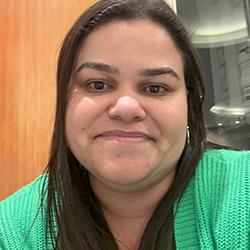
Rebeca Mendes is a lawyer, founder and director of the Projeto Vivas, and a master’s student in Bioethics, Applied Ethics, and Public Health at Fiocruz Institute. In 2017, she became the first Latin American woman to approach a Supreme Court requesting permission to have an abortion outside of legal allowances. Unfortunately, her request was not reviewed, forcing her to seek a legal abortion in Colombia. In 2020, in partnership with Anis and Professor Débora Diniz, she founded the Projeto Vivas, a nonprofit organization that helps those in need access legal abortion services. In 2023, the Projeto Vivas assisted over 400 girls and women in accessing legal abortion services in Brazil and Argentina.
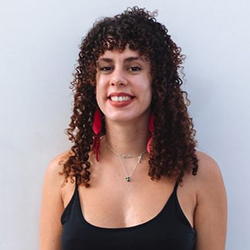
Marina Alves Coutinho is a lawyer specializing in Criminal Law and Criminal Procedure, and is currently pursuing a Master’s degree in Law from the University of Brasília (UnB), where she researches the criminalization of abortion and health emergencies (zika, covid and now oroupouche) and their impacts on vulnerable populations. She works as a Strategic Litigation and Research Analyst at Anis – Instituto de Bioética, an intersectional and multidisciplinary feminist organization that develops and works on advocacy strategies to promote reproductive justice, citizenship, equality and human rights for women and other vulnerable groups. She is a researcher at the Cravinas Legal Clinic – Practice in Human Rights and Sexual and Reproductive Rights, at the Law School of the University of Brasília (UnB), a project that, through lawsuits, complaints and other advocacy actions, works to eliminate obstacles to guaranteeing sexual and reproductive rights, combat hate speech and attacks on human rights defenders, and hold the State accountable for human rights violations.
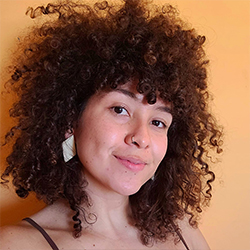
Raquel Lustosa is a PhD candidate in anthropology at the Federal University of Pernambuco (UFPE). She works as a Strategic Litigation and Research Analyst at Anis – Institute of Bioethics and Human Rights, an intersectional and multidisciplinary feminist organization that develops and works on advocacy strategies to promote reproductive justice, citizenship, equality and human rights for women and other vulnerable groups. She is a member of the CASCA (Collective of Anthropology and Public Health) research, teaching and extension laboratory at the University of Brasília (UnB) and the FAGES (Family, Gender and Sexuality) research center at UFPE. She is a full member of the Ethics and Research Committee of the Institute of Human Sciences at UNB (CEP/CHS). She is a member of the Transnational Research Network on Deprived, Violated and Abused Motherhood (REMA – CNPQ). She also works on the State Committee on Maternal Death in Pernambuco, where she conducts research on maternal death during the Covid-19 pandemic.
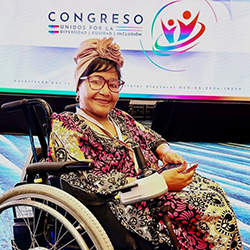
Cristina Francisco has spent over 20 years advocating for the rights of people with disabilities in areas such as gender, political participation, and sexual and reproductive rights in the Dominican Republic. Paraplegic since the age of 9, she founded the Circle of Women with Disabilities (CIMUDIS), an NGO that advocates for the social inclusion, rights and equal access of women living with disabilities in the Dominican Republic, in all areas of life. She is also the founder and Executive Director of the Disability Alliance for Our Rights (ADIDE) in the Dominican Republic. Cristina is the Vice President of the Latin American Network of Organizations of Persons with Disabilities and Their Families (RIADIS).

Estefanny Molina Martinez has experience as a consultant on gender and human rights. She has also worked as a researcher and teaching assistant at the Human Rights Center of the Catholic Pontifical University of Ecuador, where she worked on numerous cases related to indigenous peoples and forced disappearances in the Inter-American human rights system and domestic courts. She has worked for the Ministry of Justice, Human Rights, and Religion of Ecuador, monitoring Ecuador’s compliance with international obligations before the Inter-American and universal human rights systems. She has given many talks and trainings on gender, human rights fundamentals, international human rights systems, indigenous rights, and human trafficking for purposes of sexual exploitation. Estefanny received her law degree from Catholic Pontifical University (Ecuador) and her Master in International Protection of Human Rights from the University of Alcalá (Spain). She holds a PhD Cum Laude from the University of Alcalá in Interdisciplinary Gender Studies with a thesis on the protection of women trafficking victims of sexual exploitation from a gender perspective.

Amanda Septimo is a NY Aseemblywoman for the Bronx – Assembly District 84. She a lifelong Bronx resident with a long, rich history of service to the community. Her spirit of activism and community leadership began in her adolescence and can be traced through the entirety of her career. At just 12 years old, Amanda became aware of the prevailing social, economic, and environmental injustices within our community, and soon began to organize around these causes throughout the South Bronx. Throughout her college years, Amanda served as an intern with the Legal Aid Society fighting cases of domestic violence, with an emphasis on Spanish-speaking immigrants. After her years at Vanderbilt, Amanda brought the work of her youth full circle and went on to work with Congressman Jose 47 84th Assembly District E. Serrano — whom she interned with for two years in high school — as a Community Liaison, before being promoted to District Director at 23 years old. In these four years, Amanda was able to observe the powerful connection between policy and opportunities for progress for people in The Bronx. Today, Amanda Septimo continues the fight to bring true equity in the South Bronx, so that people can get access to the resources, support, and representation they deserve.

Mariana Ardila is an expert in women’s rights, transitional justice and litigation as a platform for social change. She is the Transitional Justice Delegate of the Ombudsperson’s Office in Colombia. In Colombia, Mariana has successfully litigated various cases before the Constitutional Court. She was one of the leading plaintiffs in the historic case decriminalizing of abortion in Colombia up to 24th week of pregnancy, and was part of the Causta Justa movement. Mariana holds a law degree from the Externado University of Colombia and a Master’s Degree in International Legal Studies from New York University (NYU). She is a law professor at Externado University of Colombia, and has published books on reproductive rights including a book about the case that decriminalized abortion in Colombia in 2022. In 2022 she received the Women’s Media Center Progressive Women’s Voices IMPACT Award for her work on reproductive rights.
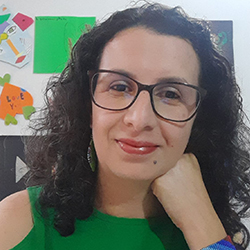
Carolina Dueñas Orozco is a professional in communications and journalism, holding a master’s degree in political studies. She has over 18 years of experience developing and executing communication strategies for human rights organizations, particularly for international organizations focused on sexual and reproductive rights. She is currently an independent consultant. Between 2014 and 2023, she was part of the communications team at Women’s Link Worldwide, where she led, developed, and supported the execution of communication strategies for various litigations, such as the “Esperancita” case in the Dominican Republic and the process for expanding access to abortion in Colombia (Causa Justa), among others. Previously, she worked at Brújula Comunicaciones Estratégicas, one of the pioneering companies in Colombia and Latin America in providing strategic communication support to various social organizations. In 2005, Brújula developed the communication strategy for the partial decriminalization of abortion, which was promoted by Women’s Link Worldwide in Colombia at that time. Carolina is the author of the chapter on sexual and reproductive rights and abortion in the Manual of Inclusive Communications: Conversations in Movement, developed by the Inspiratorio.
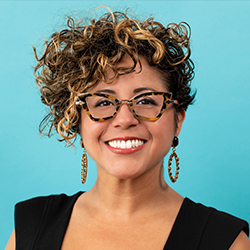
Faviana Rodriguez is an interdisciplinary artist, cultural strategist, and entrepreneur based in Oakland, California. Her art and praxis address migration, reproductive justice, climate change, racial equity, and sexual freedom. Her work centers joy and healing, while challenging entrenched myths and dominant cultural practices. Favianna’s creative partnerships include institutions like Partnership with the Presidio, Golden Gate National Parks Conservancy, Ben & Jerry’s, Spotify, Old Navy, and Playboy Magazine. Through her poignant speeches, she has inspired audiences around the world including at the United Nations Climate Summit, Sundance Film Festival, Smithsonian, and Google. A strategy advisor to artists of all genres, Favianna is regarded as one of the leading thinkers and personalities uniting art, culture and social impact. Through her thought leadership as President and co-founder of The Center for Cultural Power, an organization igniting change at the intersection of art and social justice, she has been instrumental in building a cultural strategy ecosystem that supports BIPOC artists in the U.S. She helped launch the Constellations Culture Change Fund, a philanthropic initiative that invests in BIPOC artists and grassroots art organizations. She is a recipient of the Robert Rauschenberg Artist as Activist Fellowship, the Atlantic Fellowship for Racial Equity, and the Soros Equality Fellowship.

Juana María Rodríguez is a cultural critic, public speaker, and award-winning author who writes about sexual cultures, racial politics, and the many tangled expressions of Latina identity. A Professor of Ethnic Studies; Gender and Women’s Studies, and Performance Studies at UC Berkeley, she is the author of Puta Life: Seeing Latinas, Working Sex (Duke UP 2023); Sexual Futures, Queer Gestures, and Other Latina Longings (NYU Press 2014); and Queer Latinidad: Identity Practices, Discursive Spaces (NYU Press, 2003).
She also served as a co-editor of the special issue of TSQ: Transgender Studies Quarterly on “Trans Studies en las Americas.” In addition to her many publications in academic journals, her work has been featured in Aperture; on NPR’s Latino USA, NBC.com, Canadian News Network, The Chronicle of Higher Education, and Cosmopolitan for Latinas. In 2023, Dr. Rodríguez was honored by The Center for Gay and Lesbian Studies’ with the prestigious Kessler Award, in recognition of her significant lifelong contributions to the field of LGBT Studies.

Mindy Jane Roseman is the Director of International Law Programs and Director of the Gruber Program for Global Justice and Women’s Rights. Prior to joining Yale Law, Roseman was the Academic Director of the Human Rights Program and a Lecturer on Law at Harvard Law School from 2005-2016 where she taught courses on gender and human rights, as well as reproductive health and justice. Roseman was also an instructor in the Department of Population and International Health at Harvard School of Public Health. Before joining Harvard, Roseman was a staff attorney with the Center for Reproductive Rights in New York, in charge of its East and Central European program.
As both a researcher and advocate, Roseman specializes in international health and human rights, particularly as they relate to gender, sexuality, and reproduction. She has fostered the development of health and human rights norms, as well as their implementation, at the international and national level. Recent publications include Abortion Access: Comparative Perspectives (edited with Rachel Rebouché, forthcoming NYU Press 2025) and Beyond Virtue and Vice: Rethinking Human Rights and Criminal Law (edited with Alice Miller, University of Pennsylvania Press, 2019).
Roseman received her J.D. from Northwestern University School of Law and served as an Articles Editor on its Law Review. She holds a Ph.D. from Columbia University, in Modern European History with a focus on reproductive health.
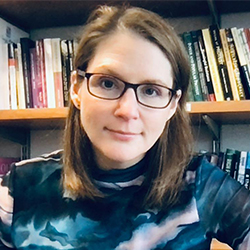
Jocelyn Viterna is Chair of Studies of Women, Gender, and Sexuality and Professor of Sociology at Harvard University. Her research examines how social mobilization affects gender norms and practices in politics, in government institutions, in warfare, and in communities. Currently, Viterna is developing four research projects.
The first project documents how activism surrounding women’s sexual and reproductive rights in El Salvador has fundamentally transformed the Salvadoran judicial system, and more specifically, its processes for litigating gender. Building from this research, Viterna is developing and deploying training programs aimed at mitigating implicit bias and gender discrimination in Latin American courts.
The second project examines how Salvadoran ob-gyns care for pregnant women and fetuses while negotiating the nation’s absolute abortion ban, and how the ban affects pregnancy health.
The third project compares the discourse and tactics of 8 conservative and 8 progressive social movements in the U.S., investigating whether and how each camp strategically mobilizes notions of “gender.”
Finally, Viterna is developing a book manuscript that situates the Salvadoran case in a broader regional and transnational context to better understand how transnational activism shapes global trends in reproductive health and justice.
Viterna’s work has been published in the American Journal of Sociology, the American Sociological Review, Politics and Gender, and the Latin American Research Review, among other journals. Her book, Women in War: The Micro-processes of Mobilization in El Salvador (2013, Oxford University Press) won four distinguished book awards (the ESS Mirra Komarovsky award, the ASA Section on Sex and Gender award, the ASA Section on Political Sociology award, and the SSSP Global Division award) and one honorable mention (the ASA section on the Sociology of Development). It is currently being translated for publication in Spanish.
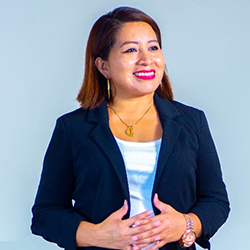
Teodora Vásquez is the Founder of Mujeres Libres, Defender of the Human Rights of Women and Girls.
She was sentenced to 30 years in prison after having a stillbirth in El Salvador. She was accused of inducing an abortion at nine months pregnant, in a country where abortion is totally prohibited. Despite spending more than 10 years in prison, Vásquez has transformed her pain and resentment into a story of activism and inspiration. In 2018, Vásquez was awarded the Swedish Per Anger Prize for her courageous struggle on behalf of women. Today, she is the founder and president of Mujeres Libres de El Salvador, an organization that empowers women and provides them with the information they need to protect themselves, as well as assistance with social reintegration upon their release from prison. Teodora Vasquez is a publicist by profession and community theater actress with a gender focus.
Teodora is also a protagonist of the documentary FLY SO FAR.
Soledad Deza is an Argentinian feminist lawyer and women’s rights activist and President of Mujeres X Mujeres, a non-governmental feminist organization committed to the defense of women’s human rights and the eradication of violence in all interpersonal relationships. For 5 years she was the Legal Coordinator of ‘Catholics for the Right to Decide’ in Argentina. Dr. Deza practices law in Tucumán, one of the most conservative provinces of Argentina. She has been representing women unjustly prosecuted for miscarriages and legal abortions and in 2016 she became known nationwide as the lawyer of Belen, a woman who was jailed after being accused of murder following a miscarriage. Belen’s case became a landmark in the battle for legal abortion, showing the grave misconduct of medical and legal officers. In 2017, Dr. Deza argued another important abortion case against several medical doctors who obstructed the right to legal abortion of a woman carrying an anencephalic foetus. Although Argentinian law allows such an abortion for medical reasons, it was arbitrarily denied. Due to Dr. Deza’s intervention, the woman was finally allowed to end her pregnancy and an investigation was conducted regarding the unlawful obstruction of her reproductive rights. Dr. Deza reached the federal Supreme Court in the quest for public accountability of medical practitioners and public officers who interfere with women’s rights. Despite great challenges and obstacles, she has helped many women in vulnerable situations, who did not have the means to pay for quality legal assistance. She is a leading voice in the current debate over legal abortion. Her work has advanced women’s rights and access to sexual and reproductive health care and has inspired future generations of lawyers.

Marta Alanís is a Catholic and feminist. As a political and social activist, she has extensive experience in popular and gender education, and her entire life has participated in human rights and women’s organizations. In 1993 she founded Catholics for the Right to Decide Argentina along with other feminist leaders. She has been a founder, promoter and activist in the National Campaign for the Right to Legal, Safe and Free Abortion. She is recognized as a leader on an international level, and has consulted and participated in numerous research, communication productions and artistic projects.

Ximena Casas (she/her) co-leads the Regional Initiative on the Criminalization of Abortion in Latin America with Ríos-Rivers. Prior to this, she was the Women’s Rights Researcher for the Americas at Human Rights Watch. She also worked for Planned Parenthood Global as the Associate Director for Regional Advocacy Strategy where she managed the Latin American Regional Advocacy and Policy projects and was the region’s specialist on international jurisprudence on reproductive rights. She previously worked at the Center for Reproductive Rights (CRR), where she focused on litigation strategies to advance the recognition of sexual and reproductive rights of Latin American women and was the Americas associate at Human Rights Watch. She has specific knowledge of international human rights law, humanitarian law, and gender law. She is an expert in non-discrimination and gender equality, with strong experience in intersectionality and sexual and reproductive rights and health. Ximena grew up in Colombia and has experienced extensive travel and fieldwork through the Latin American and Caribbean region.
- About
- Episodes
- Trailer
- E1: Argentina – Birthplace of the Green Wave
- E2: El Savador – No Exceptions
- E3: Latinidad – Sex and Sexuality
- E4: From Three Exceptions to Decriminalization
- E5: The Fight for Three Exceptions – Is It Enough?
- E6: Brazil – Crossing Borders For Care
- E7: U.S. Part 1 – Storytelling, Conversation, & Community
- E8: U.S. Part 2 – The Green Tide Rises
- BONUS EPISODE: Election Recap – This Is Not The End Of The Fight
- Voices
- Join The Movement
- Impact
- Support
- Contact
This project was produced with the support of the International Women’s Media Foundation (IWMF) as part of its Reproductive Rights, Health, and Justice in the Americas initiative.
© Green Tide Rising, LLC, 2024.

